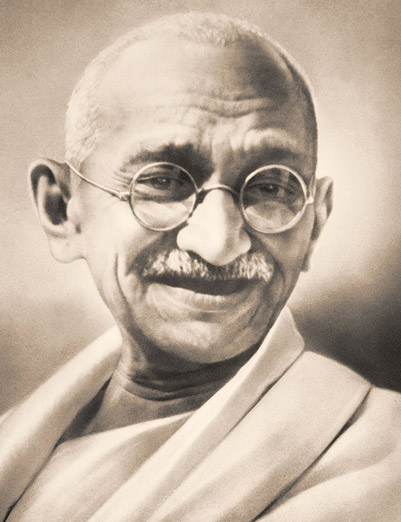The views expressed in our content reflect individual perspectives and do not represent the authoritative views of the Baha'i Faith.
But I say to you, Love your enemies and pray for those who persecute you, so that you may be sons of your Father who is in heaven; for he makes his sun rise on the evil and on the good, and sends rain on the just and on the unjust. – Jesus Christ
If you want to make peace with your enemy, you have to work with your enemy. Then he becomes your partner. – Nelson Mandela
It is easy enough to be friendly to one’s friends. But to befriend the one who regards himself as your enemy is the quintessence of true religion. The other is mere business. – Mahatma Gandhi
Baha’u’llah has clearly said in His Tablets that if you have an enemy, consider him not as an enemy. Do not simply be long-suffering; nay, rather, love him. Your treatment of him should be that which is becoming to lovers. Do not even say that he is your enemy. Do not see any enemies. Though he be your murderer, see no enemy. Look upon him with the eye of friendship. Be mindful that you do not consider him as an enemy and simply tolerate him, for that is but stratagem and hypocrisy. To consider a man your enemy and love him is hypocrisy. This is not becoming of any soul. You must behold him as a friend. You must treat him well. This is right. – Abdu’l-Baha, The Promulgation of Universal Peace, p. 267.

Mahatma Ghandi
I can’t think of anything harder than the task all true religion sets in front of each of us: love your enemy. Gandhi calls it “the quintessence of true religion,” and the Baha’i teachings ask us to return love for enmity. Have you ever tried it?
I have, and I can tell you, I don’t think I did it that well. I worked as an executive in a large corporation at one point in my career, and somehow made an enemy there, an executive in another department. I won’t name him, but he was a bright, ambitious young guy who I actually respected. He had an incisive mind and a quick wit, and I actually thought we might become friends when I first met him.
Needless to say, that didn’t happen. I honestly don’t know why. I never harmed him in any way, but for some reason he took a strong dislike to me and decided I was his enemy. Apparently this had happened to others before me, so maybe it wasn’t personal—but my work environment deteriorated quickly after that, and life became difficult. He set out to get me fired.
I hadn’t done anything to make that possible, but he had some influence with the top executives, and he had the power to make my life pretty miserable. I actually asked him what I could have possibly done to make him so angry, but he refused to answer, so I felt like I had no recourse. All I could do was try to convert my natural anger to love, and try to treat him well.
Did it work? I don’t know. I certainly tried my hardest to “look upon him with the eye of friendship,” as the Baha’i teachings recommend. He didn’t ever reciprocate, but I did my best. Perhaps I should have tried harder. I do know that the people around me were strongly affected by the stance I tried to take, and maybe that was the lesson—if you give love, even in difficult situations, it can help inspire others.
This challenge to our characters—doing as the prophets did and loving everyone—truly tests the soul. We battle with our own emotions when we try to love our enemies, fighting hard with the natural animal instincts that tell us to get mad and get even. If we have unresolved issues with anger and resentment for past poor treatment from others, the struggle becomes even more pronounced.
Religion can help. It can give us role models for love in the lives of the prophets. It can build loving communities. It can inspire us with beautiful teachings of kindness, forgiveness and mercy. It can guide us down a peaceful path, and help us see the benefits of resolving conflict and forging unity:
History informs us that every age has its special ties which bind the people together; but the strongest tie of all ages, the unbreakable tie which binds the hearts together, is the tie of true religion. Religion has been the means of uniting contending nations and harmonizing warring tribes. There is no agency on this planet more potent than the power of religion. Consider for a moment that in the era of Christ there were many nations who were thirsty for one another’s blood, carrying at intervals fire and sword over the border lines. There were the Romans, the Greeks, Chaldeans, Assyrians and Egyptians. It was impossible to unite these conflicting tribes and peoples; but when the power of religion came into action it swept away all these barriers and cemented these nations that for ages had been waging war.
By the word religion I do not mean the present dogmatic and theological superstitions which are in the hands of the people. By religion I mean the world of celestial attributes. After the moral aspect of humanity becomes readjusted, then the greatest unity will be realized; but without this moral readjustment it is impossible to establish harmony and concord, for it is a fact that war, conflict, friction and strife are but the visible results of deterioration of morality and corruption of character. But when the morality of humanity is beautified with praiseworthy virtues there will be an end to war. – Abdu’l-Baha, Divine Philosophy, pp. 176-177.
Do you have enemies? Then why not try to take the anger and hatred you feel for those people and convert it into love? Why not clear the space in your heart that you currently have reserved for all those negative, harmful emotions; and give yourself the peace of mind and tranquility of soul your heart really wants? Anger and bitterness and hatred, like acid, only corrode the vessel that tries to contain them.
In one sense, we can look upon this kind of interpersonal conflict with other people in our lives as our own personal struggle with war and peace, at the most basic one-on-one level. If you sincerely want to end war, then, start at home. Your first task—mounting a diplomatic initiative to reach a peace agreement with someone you’ve had trouble with—might begin with a friendly overture; with a sincere apology; with a kind gesture. By overcoming your natural hostility and trying to truly feel love for someone who doesn’t love you, you’ll transform your life and the lives of people around you. Give it a try. You have nothing to lose but your enmity, and your enemies.

















Comments
Sign in or create an account
Continue with Facebookor